
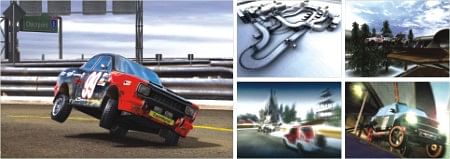
This game is nothing like other car games where simulation is a big concern. Here it is all about ripping around and having fun disregarding certain laws of physics. Sure they may be cars but no one said you cannot fly. Well, many do but don't listen to them.
Vehicle have loose physics and slide very easily. That makes for fun cars with fantastic tracks featuring insane jumps, hoops and other acrobatics through picturesque backgrounds. What's more is that all this craziness is only limited by your imagination as you can design your own tracks with the powerful, easy-to-use track editor.
There are three modes of play. Race is the most down-to-earth option. Like in Sunrise, you run time trials alone or against gold, silver, and bronze pace cars. However, opponents are just ghost cars to push you to better times, as you can't collide with them. Races take place in seven different track categories that unlock as you collect a requisite number of gold and silver finishes. Categories offer different scenery and racing styles. Stadium, for example, sees you guiding formula one-style cars around racetracks in concrete domes, while Desert features trucks on dirt roads. Rally boasts rally cars on grass in windmill-laden pastoral Europe, and Snow takes you to the mountains on ATVs.
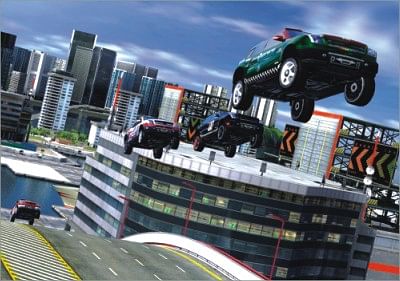
Repetition is a bit of an issue when racing, despite the dozens and dozens of tracks included in the game. Each map type repeats the same scenic elements, only varying the time of day and adding glitz like red sunsets and neon nights.
Still, you don't spend enough time on any one track to get bored. Tracks range from 10-second drags in the opening stages to slightly more winding treks that take a minute or two to complete. Also, the challenge is strong enough that you can find yourself running a race a couple-dozen times in a row to try to catch the perfect performance of the gold car. Just the slightest mistake puts you in second place, so don't underestimate the toughness of what looks to be a shiny, happy arcade game.
The platform mode is fiendishly addictive where you have to deal with jumps that don't line up, holes that drop you into watery graves, tunnels that whip you around like a pinball, and outrageous one-after-the-other leaps to floating platforms suspended in midair. These tracks beautifully balance learning with driving skill.
Compared to the above, the puzzle mode of play is a big letdown. As in Sunrise, this option sees you building tracks from a top-down perspective. It's an interesting concept, though it seems as out of place with the other two modes as pizza does with rice, and solutions rarely seem logical. As the other options are such pure fun, puzzle really isn't worth much of your time.
But while puzzle makes you question what the developers were thinking, the visuals make you ask how the heck they managed to make a game look this good and run this fast. Frame rates fly on even a low-end machine, and tracks load in seconds (restarts are instantaneous), even though the appearance of the game hasn't been compromised at all. Tracks are designed around postcard vistas like tropical beaches, historic countrysides, and snowy cliffs. Big jumps often trigger the camera switching to a panoramic view of the action, further emphasizing the attractiveness of the backdrops and adding a Fall Guy feel. In-game advertising is the only sore point.
Overall, TrackMania United has a dreamy, fantasy vibe that could fulfill a kid's slot-car dream. Veterans of the previous two games in the series might find it too much of a been-there, done-that sequel, but it's perfect for anyone who appreciates speed, imaginative track design, and a definitively offbeat take on running cars around in circles.

By Tareq Adnan

Grunge, the sound from Seattle, the sound that shook the world for one half of the 90s, started off in a place whose music scene was mostly ignored by the mainstream. With bands like Nirvana and Alice in Chains the genre gained worldwide popularity.
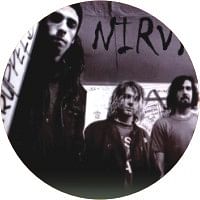 Evolving from the local Seattle punk scene the whole grunge-style music was influenced by bands such as The Fartz, The U-Men, 10 Minute Warning, The Accused, The Fastbacks and The Melvins. With an infusion of classic heavy metal with punk, grunge became a genre that not only appealed to the younger generation of listeners but actually became a force to be reckoned with. In the early 90s, bands like Nirvana and Pearl Jam frequented the Top Charts all over the world, prompting them to be tagged as the poster children of Generation X.
Evolving from the local Seattle punk scene the whole grunge-style music was influenced by bands such as The Fartz, The U-Men, 10 Minute Warning, The Accused, The Fastbacks and The Melvins. With an infusion of classic heavy metal with punk, grunge became a genre that not only appealed to the younger generation of listeners but actually became a force to be reckoned with. In the early 90s, bands like Nirvana and Pearl Jam frequented the Top Charts all over the world, prompting them to be tagged as the poster children of Generation X.
Musically, grunge used distorted guitar work that depended on fuzzy feedbacks effects to create a raw sound unique to the genre. Punk and heavy metal characteristics featured heavily in the composition with bands mixing the slower tempos and intricate musical instrumentation with the much simpler punk sound. Indie rock attitudes with the artists more concerned with musical expressions was a defining element of the grunge bands with bands trying out more and more experimentation in their own respective styles.
In terms of lyrics the genre followed dark and repressive themes of angst and depression. Most of the songs were based around social alienation, disenchantment with society and a need for freedom from traditional and social bonds. Using a simpler form of presentation in their concerts and their music grunge shunned the ongoing norm of the complex high tech performances used by other mainstream genres. The musicians themselves opted for simple ordinary appearances wearing ordinary clothes and moved away from the flashy culture of the 80s. Generally, most of them displayed an unkempt appearances but it was never taken as a conscious attempt to create a fashion.
Mainstream success for grunge came all at once with numerous bands being signed onto major labels, among them Soundgarden being the first. However, the early major label debuts from bands like Alice in Chains and Screaming Trees were considered as minor successes. It wasn't until Nirvana's Nevermind did grunge really break into the scene. With their lead single 'Smells Like Teen Spirit' the album quickly became a tear away success almost overnight. With Nevermind's success, alternative rock and more specifically grunge entered the music scene.
With commercial successes taking place frequently, and more and more grunge bands achieving fame and albums like Pearl Jam's Ten topping the charts the genre became a force to be reckoned with, redefining the musical tastes of the era. Seattle became the 'new Liverpool' of the music industry as grunge bands became famous.
However, the overwhelming success became an obstacle rather than a blessing as grunge artists were uncomfortable with the undue attention being shown to them. With success came expectations and people demanded more of the same that had made grunge successful. This led to the musicians complaining of not being able to experiment with their music, which was what grunge started out to be.
Over the latter years of the 9os, grunge took a slump as post grunge bands emerged, i.e. bands that had the grunge sound but none of the roots or the need to experiment.
The new genre was an influenced, more commercially viable option that major labels took up. In the UK, Britpop, emerged in retaliation with a more exuberant and cheery outlook to contrast the darker grunge genre. From the experimentations of the early 90s, grunge had become a wildly popular genre with dark, introspective themes.
As the 90s progressed the famous grunge bands started dissolving, starting with Nirvana's Kurt Cobain committing suicide which prompted the fall of the band. Other bands like Alice in Chains and Soundgarden disbanded. Pearl Jam's feud with Ticketmaster meant that Pearl Jam couldn't host shows in the USA as most venues were run by them, with a few minor exceptions.
However, even though the genre has gone down from its initial glory, grunge still manages to be a large and influencing part of the music industry today with erstwhile bands like Nirvana and Alice in Chains still being revered and listened to by millions worldwide
Movies
Comic ability in actors is rare. Some try, some pretend but to a few it comes naturally as walking. Steve Carell and The
Rock are as different as they can be and so is their style of comic delivery.
Reviewed by Gokhra

Cast & Credits
Dan Burns: Steve CarellMarie:
Juliette Binoche
Mitch Burns:
Dane Cook
Clay Burns:
Norbert Leo Butz
Poppy Burns: John Mahoney
Nana: Dianne Wiest
Ruthie: Emily Blunt
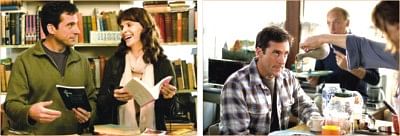
Steve Carell is undoubtedly a very, very funny guy and he uses it all in a very laid back low-key style making him look like an everyday regular guy. And that makes him perfect for the romantic comedy "Dan in Real Life."
Carell plays Dan Burns whose wife died four years. He works for as a newspaper advice columnist and juggles time with his family of three girls that he raises on his own.
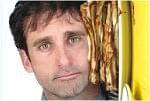 For Thanksgiving, he takes them all to his parents house which is a huge beach house. Also on hand is Dan's brother Mitch (Dane Cook). How does he figure in the sotry? It comes a little later.
For Thanksgiving, he takes them all to his parents house which is a huge beach house. Also on hand is Dan's brother Mitch (Dane Cook). How does he figure in the sotry? It comes a little later.
The story ambles along gently enough as Dan strolls into town one day and runs into Marie (Juliette Binoche) in a bookstore. They hit off on a long conversation with him ending up with her phone number. Love is not yet in the air and to put a twist in the tail, Dan's brother Mitch brings his girlfriend home that evening and she is none other than Marie.
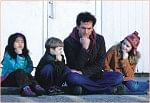 Mitch and Marie are actually in love. Dan and Marie on the other hand feel some sort of a filling relationship growing between them but they can't just get on with it because of social obligations. That's basically it and how all the complicated situations are and emotions are made to fit.
Mitch and Marie are actually in love. Dan and Marie on the other hand feel some sort of a filling relationship growing between them but they can't just get on with it because of social obligations. That's basically it and how all the complicated situations are and emotions are made to fit.
The movie has big laughs and plenty of big moments involving all the major characters.
The movie expresses pure notions of love with sweet performances by Binoche. And that's basically what this movie is: sweet.

Cast:
Dwayne ``The Rock'' Johnson -
Joe Kingman
Madison Pettis - Peyton Kelly
Kyra Sedgwick -
Stella Peck
Roselyn Sanchez - Monique Vasquez
Morris Chestnut - Travis Sanders
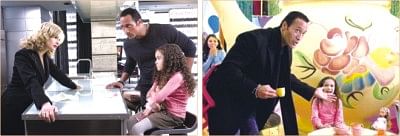
"The Game Plan" brings back The Rock and that in itself makes for a good enough reason to watch the movie. .
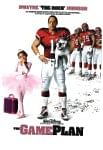 We find ourselves in Boston where The Rock is a football superstar for a team called Boston Rebels. Now that wasn't much of a surprise. Joe Kingman (The Rock) is in love with himself but he is also charming but the vanity will fall otherwise it does not fall into the movie formula. And yes, this movie is formulaic but a compelling story is always welcome even when it sticks to a rule.
We find ourselves in Boston where The Rock is a football superstar for a team called Boston Rebels. Now that wasn't much of a surprise. Joe Kingman (The Rock) is in love with himself but he is also charming but the vanity will fall otherwise it does not fall into the movie formula. And yes, this movie is formulaic but a compelling story is always welcome even when it sticks to a rule.
One day a little girl named Peyton (Madison Pettis) turns up at his door. She happens to be the 7-year-old daughter of an early marriage that did not work. He never knew of her and it's all explained in great detail in the movie. And that's the brief of the movie father daughter bond.
 Peyton moves in with Joe despite all arguments from Joes agent. Throughout the movie she manages to charm everyone without making it a heavyhanded dose of sugar sweetness. The bond grows charmingly without appearing too contrived.
Peyton moves in with Joe despite all arguments from Joes agent. Throughout the movie she manages to charm everyone without making it a heavyhanded dose of sugar sweetness. The bond grows charmingly without appearing too contrived.
Peyton's a student ballerina and that means big daddy Rock has to get into the whole fatherly routine including spending quality time with her dressed up in a leotard.
The Rock shows that while he still cannot act, he is no longer only good at beating evildoers into bloody pulp. He CAN do very good comedy. The twist at the end gives the hilarity a more serious dimension.
It's basically a movie for kids but who says adults cannot have fun with a good, clean movie?
